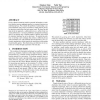Free Online Productivity Tools
i2Speak
i2Symbol
i2OCR
iTex2Img
iWeb2Print
iWeb2Shot
i2Type
iPdf2Split
iPdf2Merge
i2Bopomofo
i2Arabic
i2Style
i2Image
i2PDF
iLatex2Rtf
Sci2ools
100
Voted
PVLDB
2008
2008
Output perturbation with query relaxation
Given a dataset containing sensitive personal information, a statistical database answers aggregate queries in a manner that preserves individual privacy. We consider the problem of constructing a statistical database using output perturbation, which protects privacy by injecting a small noise into each query result. We show that the state-of-the-art approach, -differential privacy, suffers from two severe deficiencies: it (i) incurs prohibitive computation overhead, and (ii) can answer only a limited number of queries, after which the statistical database has to be shut down. To remedy the problem, we develop a new technique that enforces -different privacy with economical cost. Our technique also incorporates a query relaxation mechanism, which removes the restriction on the number of permissible queries. The effectiveness and efficiency of our solution are verified through experiments with real data.
Related Content
| Added | 28 Dec 2010 |
| Updated | 28 Dec 2010 |
| Type | Journal |
| Year | 2008 |
| Where | PVLDB |
| Authors | Xiaokui Xiao, Yufei Tao |
Comments (0)

